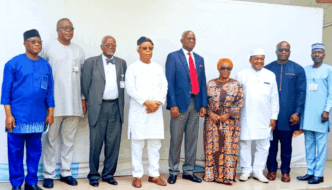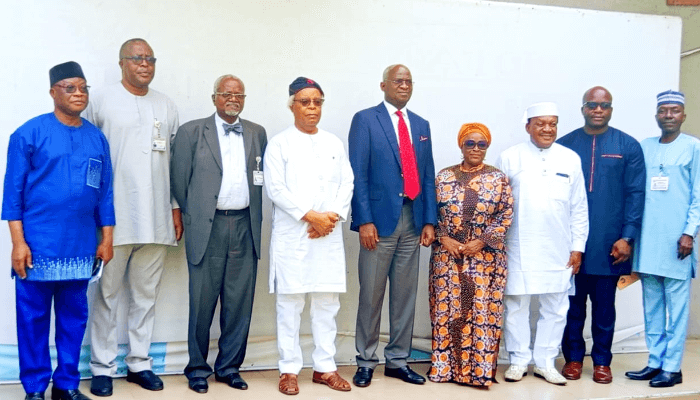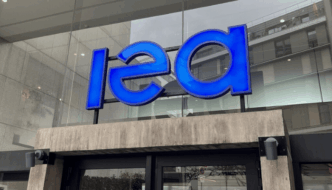…As NIMR Foundation mobilizes N502m to strengthen Nigeria’s medical research capacity
Nigeria continues to trail countries such as India, South Africa, the United States, and the United Kingdom in medical research funding, raising concerns over the country’s ability to generate homegrown solutions to pressing health challenges.
Speaking at the November edition of the Nigerian Institute of Medical Research (NIMR) Monthly Media Chat in Lagos, Mr. Babatunde Raji Fashola, SAN, chairman of the NIMR Foundation Board of Trustees, said the NIMR, established by an Act of Parliament in 1977, has not received the level of sustained national attention and investment that its counterparts enjoy in other countries.
“NIMR was created by the federal government, yet it does not enjoy the kind of attention that similar institutes receive in India, South Africa, the United States or the United Kingdom,” Fashola told journalists.
Using everyday examples to drive home the transformative power of research, the former minister of Works and Housing asked: “How many of us are wearing glasses today? What would life be without them? Would we have glasses without research?”
He reminded the audience how the discovery of penicillin in 1928 dramatically increased global life expectancy and urged Nigeria to imagine an equally historic breakthrough. “What would life be like if the cure for cancer was found here in Nigeria? Don’t you think it’s possible?” he asked.
Read also: FG plans medical relief programme to ease cost of care for Nigerians
Meanwhile, in a four-year impact report covering 2021–2025, the NIMR Foundation disclosed that it has successfully mobilized N502 million through donations and seed funding from NIMR. Out of this, N295.9 million has been disbursed to research programmes and operations, while a net income of N148.9 million was earned through prudent investments managed under a SEC-regulated trust fund by UTL Trust Management Services Limited.
The Foundation’s efforts focus on capacity building, funding mobilization, and advocacy. Its Grantsmanship and Mentorship Training Programme (GMTP) has trained 120 early-career researchers, equipping them with the skills to secure research grants, produce scientific papers, and participate in international fellowships. GMTP Fellows collectively secured N590.9 million in new research grants and N197.3 million in travel awards and fellowships, with 242 scientific papers produced, including seven already published in high-impact, indexed journals.
The Foundation’s investment strategy demonstrates tangible returns. For every N1 invested in training and mentorship, Fellows generated N2 in external research grants, representing a 200 percent return on social investment. These figures illustrate the potential of strategic, well-managed funding to elevate Nigeria’s research ecosystem.
Fashola revealed that members of the NIMR Foundation Board of Trustees serve voluntarily and often dip into personal resources because they believe in the institute’s mission.
He appealed to government, philanthropists, corporate Nigeria and the media to evangelise for research and help close the funding gap that threatens the country’s ability to tackle present and future health challenges.
Professor John Oladapo Obafunwa, director general of NIMR, explained that the NIMR’s constraints include gaps in human capital, sustained research funding, and long-term capacity development. While infrastructure can be funded, building scientific talent requires fellowships, postdoctoral programs, and strategic partnerships with international and domestic stakeholders, he added.
“The NIMR Foundation was established to bridge these gaps, mobilize resources beyond what government can provide, and support research that addresses Nigeria’s health priorities,” Obafunwa said.
After nine months of monthly media chats, Obafunwa said the relationship between NIMR and journalists has never been stronger. Journalists now enjoy easier access to researchers, simplified resource packs, laboratory tours and dedicated training on responsible health reporting. “We don’t just want more stories,” he emphasised. “We want better stories – timely, accurate, contextualised stories that can change behaviour and influence policy.”
The monthly media briefings organized by NIMR have enhanced journalists’ access to research materials, field visits, and laboratory tours, resulting in better-informed and timely news reporting.
Highlighting the importance of media collaboration, veteran broadcaster Chief Moji Makanjuola, a member of the NIMR Foundation Board of Trustees, emphasized that research achieves full value only when it is communicated and applied. She described the media as a bridge between science and society, responsible for translating technical research into actionable insights for policymakers, healthcare practitioners, and the general public.
“Research confined to laboratories or academic journals has little impact. The media is a critical partner in shaping health literacy, combating misinformation, and promoting preventive practices. Accurate reporting can drive public health behaviour and policy,” Makanjuola noted.
Makanjuola urged journalists to simplify technical information without distortion, noting that clear communication is essential amid Nigeria’s ongoing battles with disease outbreaks, poor health literacy, and rapid technological change.
With an eye on the future, the NIMR Foundation plans to scale up the GMTP Fellowship to reach twice as many researchers annually, launch postdoctoral and PhD awards, and grow a dedicated endowment fund for sustainable research financing. Intensified collaboration with government agencies, the private sector, and development partners will be central to institutionalizing health-research funding in Nigeria.
As the NIMR Foundation mobilizes resources and builds capacity, it is clear that Nigeria is taking deliberate steps toward catching up with countries that have long recognized the critical role of medical research in national development. Yet, much more needs to be done to close the funding gap and ensure that breakthroughs in science and healthcare are not just possible abroad, but homegrown in Nigeria.









